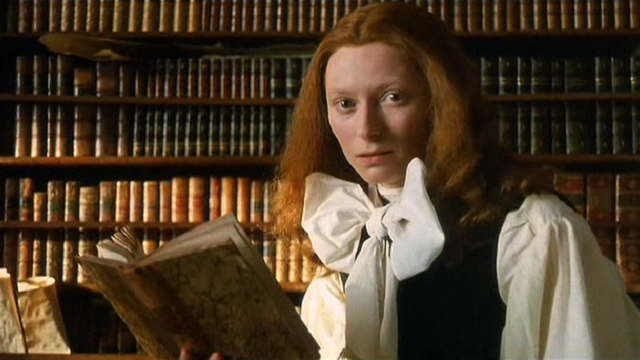Historical movies have a reputation for being stuffy examinations of old rich people that cheekily use old-fashioned puritanical values to examine humanity without the pesky distractions of modern life. Orlando, an adaptation of Virginia Woolf’s satirical novel Orlando: A Biography, explodes gender construction through its main character, a male poet befriended by Elizabeth I who one day wakes up as a woman and lives for 400 years.
Though Orlando: A Biography is a tiny novel (Wiki lists it as a mere 134 pages), it runs through hundreds of years in English literature as filtered through a gender-bent feminist perspective. The titular Orlando was told by Elizabeth I that he would inherit her wealth only if he stayed young and didn’t die. When he woke up as a woman, they examined the roles of women and men in their various writerly communities. As a novel based less in narrative than in gender theory, Orlando: A Biography is decidedly uncinematic.
According to Sally Potter, the primary challenge of adapting Orlando ” was to find a way of remaining true to the spirit of the book and to Virginia Woolf’s intentions, whilst being ruthless with changing the book in any way necessary to make it work cinematically.” Indeed, she completely rebuilt the structure of the novel in order to create an abbreviated narrative that would play to a wide selection of audiences. And, for good reason. Though non-narrative experimental cinema does exist and has the ability to challenge dominant forms of thought, they rarely appeal outside a small group of esoterics (Peter Greenaway, holla!!).
Conformity with gender expectations goes under the microscope from the very beginning. The male Orlando is played by the delightful Tilda Swinton while Queen Elizabeth I is played with such joy by British gay icon Quentin Crisp. Using a brief 93 minute running time, Potter uses Orlando to explore any number of subjects that have different expectations for men and women, and how they’ve developed over the years. From love to creation to heading a household, Orlando has to deal with the basic building blocks of life. By removing the fear of poverty through the various eras, Potter and Woolf immediately simplify the theories in their purest form; what does it mean to be a woman when you have no need to adapt for survival?
Orlando is a refreshingly strange alternative to even most feminist cinema. Woolf and Potter argue through the characters about men and women, and whether birth or conformity can actually dictate behavior. What is a feminine man in the constructs of a culture of strictly defined gender roles? What is a masculine woman? How does the past actually affect the present and the future generations? The best part is that Potter and Woolf rarely get didactic, and merely let the situational irony do all the lecturing for them. With the witty revelation that is Tilda Swinton who can express so much with just a single glance, the film is positively breezy.
Incidentally, Sally Potter has a new film, The Party, starring Emily Mortimer, Kristin Scott Thomas and Patricia Clarkson , set to premiere at Berlin next month.

